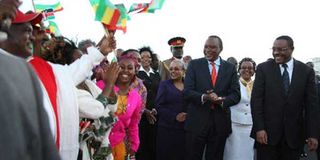Kenya asks Ethiopian firms to list on the NSE in funds search

President Uhuru Kenyatta , First Lady Margaret Kenyatta and their hosts Ethiopian Prime Minister Hailemariam Desalegn and First Lady Roman Tesfaye are entertained by traditional dancers on arrival at Bole International Airport, Addis Ababa, Ethiopia. PHOTO/PSCU
What you need to know:
- Speaking at a business forum in Addis Ababa yesterday, President Uhuru Kenyatta said his government was open to negotiations that would establish a framework for firms in the neighbouring nation to step into the Nairobi Securities Exchange.
- In a speech following bilateral talks with Ethiopian Prime Minister Hailemariam Desalegn, the president urged the country to open up its markets to Kenyan businesses in reciprocation treatment of Ethiopian business in Nairobi.
Kenya has opened the doors for Ethiopian companies to trade on the Nairobi bourse in what is seen as a move to encourage Addis Ababa to loosen its protectionist economic policies.
Speaking at a business forum in Addis Ababa yesterday, President Uhuru Kenyatta said his government was open to negotiations that would establish a framework for firms in the neighbouring nation to step into the Nairobi Securities Exchange.
“I can disclose that Kenya stands ready to begin consultations for the regulations and guidelines that would allow Ethiopian companies to raise investment capital and trade at our Nairobi Securities Exchange,” said Mr Kenyatta.
Young private sector
Although Ethiopia boasts one of Africa’s first commodity exchanges, the country does not have a stock market and this has been one of the impediments to the development of the relatively young private sector.
The nation has the largest economy in the East Africa but has remained largely untapped by foreign investors due to the government’s protectionist policies. Mr Kenyatta is leading a delegation of private sector players on a tour of Ethiopia that is expected to boost trade between the two countries.
In a speech following bilateral talks with Ethiopian Prime Minister Hailemariam Desalegn, the president urged the country to open up its markets to Kenyan businesses in reciprocation treatment of Ethiopian business in Nairobi.
SPECIAL STATUS
Mr Desalegn, in turn, called for the establishment of Special Economic Zones at strategic points on either side of the border with Kenya.
Kenya’s private sector delegation included Equity Bank’s James Mwangi, Brookside Dairy chairman Muhoho Kenyatta and Safaricom’s corporate affairs director, Mr Nzioka Waita, reflective of Kenya’s interest in Ethiopia’s financial, telecommunication and agricultural sectors.
A Special Status Agreement signed in 2012 between the two countries was supposed to give Kenyan businesses preferential access to some of these sensitive sectors.
The obstacle to implementation of the agreement is pending ratification by Ethiopia’s parliament. In Kenya, a legal loophole means that the deal does not need a nod from legislators.
“At the advice of the Attorney General, there is no need to have it ratified by Parliament since it was signed before the Act that now requires all such agreements to be taken to parliament,” said the Ministry of Foreign Affairs in a statement.
During his tour of Ethiopia, President Kenyatta is also expected to revisit agreements between the two countries on infrastructure and energy. Under a 2012 Power Purchase Agreement, Kenya is supposed to import hydroelectricity generated by Ethiopia’s Gibe III dam.
President Kenyatta said there was a need to develop a framework for joint management of water resources given the projected repercussions of the dam on Kenya’s Lake Turkana.
OTHER ISSUES ON THE TABLE
- A common approach is needed to disarm border communities to address inter-ethnic clashes and cattle rustling.
- There are many Ethiopian illegal migrants in Kenyan jails and President Kenyatta wants the two countries to agree on mutual exchange of prisoners.
- Kenya proposed a joint management framework for water resources to protect the Lake Turkana ecosystem with the construction of Ethiopia’s Gibe III dam.
- Kenya wants an agreement on avoidance of double taxation to be ratified.





